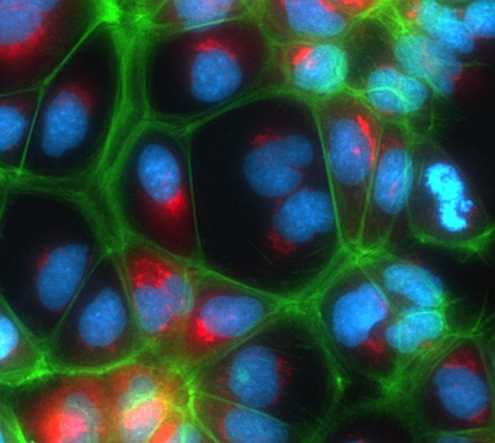Functional Liver Cells Cultured in the Lab

An international team of researchers led by The Hebrew University of Jerusalem has developed a technique to grow functional hepatocytes in vitro. The cultured cells will allow to perform drug screenings and test them on liver cell lines with specific genetic diseases, as well as to create artificial-biological livers for patients waiting for a transplant. The study was published in the journal Nature Biotechnology.
The liver is the biggest organ in the human body. It performs more than 500 functions, making it impossible to replace with an artificial device. 80% of the liver is comprised of hepatocytes, responsible for protein synthesis and storage, transformation of carbohydrates, synthesis of cholesterol, detoxification, and many other functions. The liver is often subject to drug-related injuries, so an in vitro model for drug toxicity would allow to predict the effect of drugs on the organ, appart from other clinical applications to assist liver-disease patients. However, the supply of human hepatocytes is small, and cultured hepatocyte lines tend to be non-functional and develop into immortalized cancer cells. Prof. Yaakov Nahmias and German researchers from upcyte technologies GmbH decided to tackle this problem with a new technique that allowed liver cell proliferation without losing their function.
Selecting cells responsive to Oncostatin M to remove it afterwards
The researchers based their technique in previous studies that achieved hepatocyte proliferation by mildly expressing human papiloma virus (HPV) E6 and E7 proteins and treating them with Oncostatin M (OSM), an interleukin that stimulates liver regeneration. Unlike in those studies, however, the cells didn´t evolve into cancerous, non-functional types. The researchers selected only the growing cells that responded to OSM. After proliferation, OSM was removed, allowing the cells to differenciate into functional hepatocytes in just four days. The upcyte© process generates quadrillions of cells from each liver isolation, and allows to maintain and expand cell lines derived from any donor, while keeping the same toxicology response. With this technique, the costs of studying liver disease or drug toxicity will be dramatically lower.
upcyte technologies GmbH has already commercialized a proliferating hepatocyte library for drug toxicity tests. Together with Yissum, they submitted a patent application and are looking for investors.
Source: HUJI

